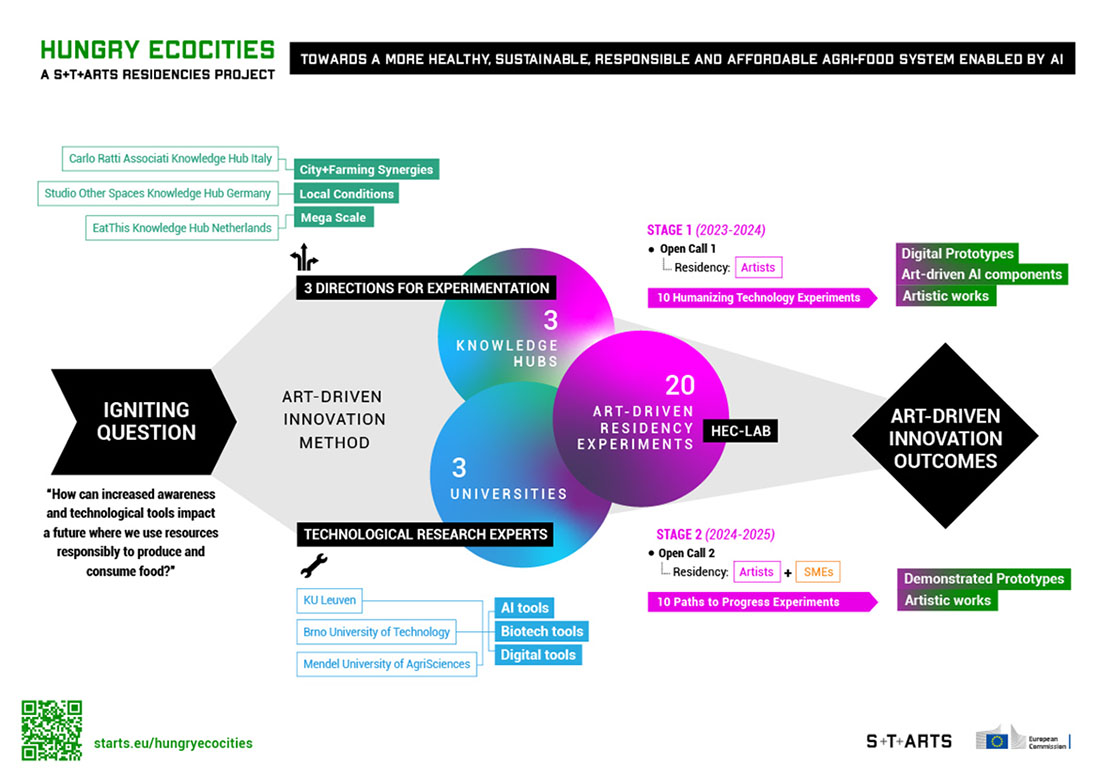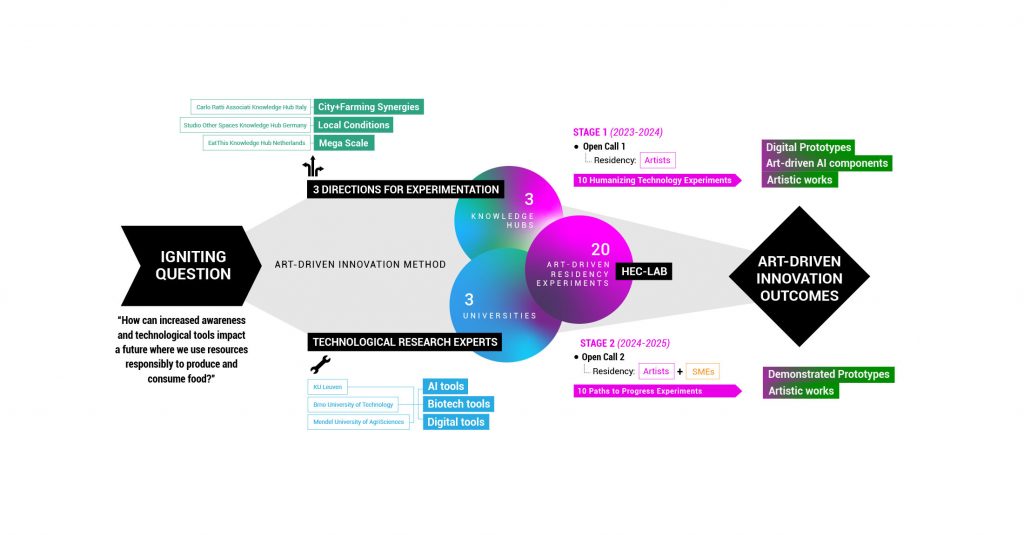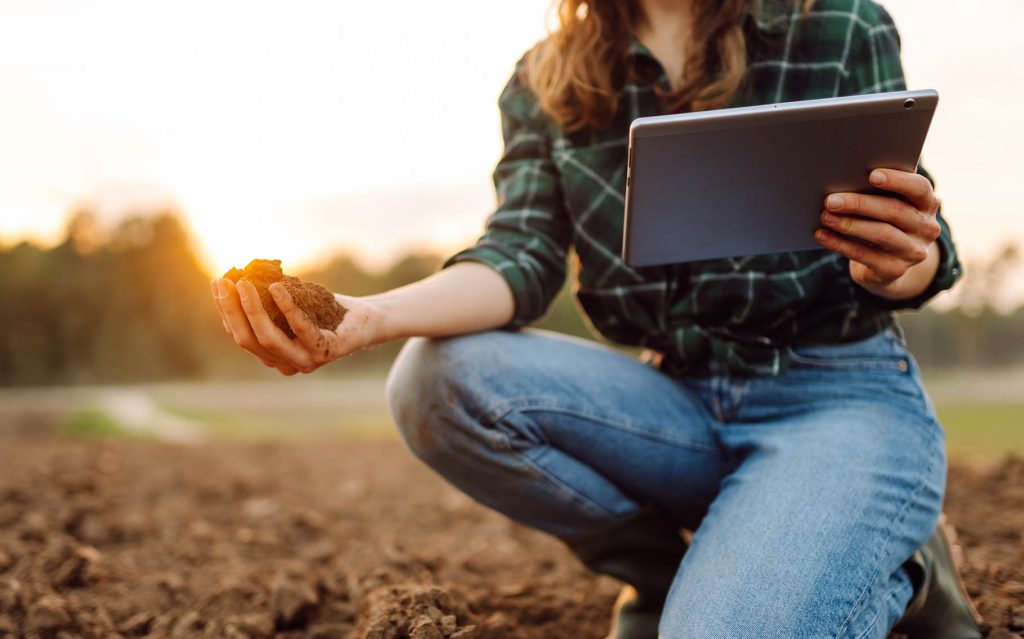S+T+ARTS Hungry EcoCities: Mega Scale, Local Conditions and City+Farming Synergies
HUNGRY ECOCITIES
○ Towards a more healthy, sustainable, responsible and affordable agri-food system enabled by AI
Food is a phenomenon shaped by the cultures we live in and an expression of millennia of experimentation, innovation, and refinement. Everybody should have access to healthy, sustainable and affordable food. At the same time, we are all aware of the fact that our food system is broken and the many challenges we are faced with as a result of this. Putting on a climate lens, food production and distribution uses too much energy, soils get degraded, valuable nutrients are lost and biodiversity threatened. Looking through an equity lens, distribution chains fail and much food goes to waste. Putting on a health lens, production needs to increase while obesity and malnutrition are increasing and the gaps between people and their food have grown.
There is also hope, in the forms of regenerative farming, organic growing, ecological footprint reductions, soil management practices and the conscious awareness and responsible uses of technologies to support food production, food consumption and food cultures at smaller and larger scales.
WHAT IS OUR SCOPE?
Whatever way we look at food and all of its elements, the coherent fact is that we must use up less resources to become truly sustainable. How can we do this? ‘How can increased awareness and technological tools impact a future where we use resources responsibly to produce and consume food?’
This igniting question will be explored in three directions for experimentation, each initiated and led by one of the creative knowledge hubs in Hungry EcoCities.
WHAT WILL WE DO?
In the project Hungry EcoCities, we choose to contribute to new stories of food production and consumption which support paths to innovation rooted in resources regeneration and human empowerment. Supported by Horizon Europe through S+T+ARTS, Hungry EcoCities will be an experimental lab for 21st century food production and consumption, running a two-staged approach with 20 art-driven experiments.
In stage 1, 10 residency experiments, called Humanizing Technology Experiments, will focus on the role digital technologies can play in growing healthy, sustainable food. Artists, capable of exploring digital questions utilizing a mix of technology and art, will be selected after the Open Call 1 process in summer 2023. Based on their artistic experimentation plans, they will collaborate with the Hungry EcoCities technological research experts to develop digital prototypes, art-driven AI components and artistic artworks within one of the three creative knowledge hubs. The outcomes of stage 1 will be made accessible through an open-source environment (HEC-l ab) and made available for testing during the second stage of the project and beyond.
In stage 2, the following 10 residency experiments, called Paths to Progress Experiments, will be selected through the Open Call 2 process for teams of artists and SMEs in summer 2024. The teams will be formed through a match-making process and will collaborate with the Hungry EcoCities consortium to develop and produce demonstrated prototypes and artistic works within the scope of the project. In addition, each SME will implement and test a number of the digital prototypes from stage 1.

OUR APPROACH: ART-DRIVEN INNOVATION
When it comes to defining choices about the future, artistic experimentation is a relevant source for analysis, guidance and innovative creation. In Hungry EcoCities, the art-driven innovation method developed by In4Art, will be followed to create the conditions for artistic experiments; a course of action tentatively adopted without being sure of the outcome.
These “experiments” give an opportunity to think differently, to bridge perspectives, to give a voice to unheard actors. Experimentation is a form of expanding the envelope of possibilities, as mediated artistic experimentation leads to a more responsible and ethical approach for testing ideas without judging them from the start. The learnings and outcome will offer another visual, tangible, experience informing the decis ion-making process for the igniting question we tackle.
THREE DIRECTIONS FOR EXPERIMENTATION: Mega Scale, Local Conditions and City+Farming Synergies.
EatThis Knowledge Hub Netherlands, led by EatThis, Stephan Petermann and Rem Koolhaas, founder of OMA, chooses the direction of mega scale. Rooted in a geographical environment dominated by controlled environment agriculture, the Westland area, the hub explores what the next phase of scale could be. Where do we grow the additional food we need with respect for nature, humans, and culture? What would it mean if a city is to sustain itself? Would it require a giga factory for food production? How will such an integrated system look like? What will it grow? How could technological scaling be combined with alternative growing techniques? Where should we grow in a warming world?
Studio Other Spaces Knowledge Hub Germany, led by Studio Other Spaces, founded by Sebastian Behmann and Olafur Eliasson, chooses the direction of local solutions based on local conditions, focusing on the potential of local environments to create local food chains. Food systems are inextricably intertwined with food cultures. How will local solutions shape what we grow, what we eat, when and with whom we eat? These systems and cultures touch people’s lives directly every day, often without us noticing. Via the food cultures perspective, SOS will engage people to increase awareness of how we interact with the world, of what we eat and why, and of how food systems and cultures are entangled with local and global economies, with knowledge systems and community living, with histories and traditions, and with education.
CRA Knowledge Hub Italy: led by Carlo Ratti Associati partners Monika Löve and Daniele Belleri, chooses the direction of finding synergies between the built environment and food production. How can we use farming to accelerate the convergence between living and technological systems? Can farming contribute to territorial regeneration in urban and peri-urban areas? Can we integrate farming into urban architecture? How can we enhance both efficiency and social relations in food production? Can we bring new farming technologies to the street market or in the supermarket?
WHAT TECHNICAL EXPERTISE DO WE HAVE?
In Hungry EcoCities we intent to merge art with digital technologies, in particular AI. AI is believed to have the potential to offer insights and tools into how we can grow and provide food for a growing global population, while minimizing our dependence on fossil fuels and increasing the wellbeing of local environments and people. All S+T+ARTS residency experiments will use digital technology in their development in close collaboration and with support of the technological research experts in the project team, coming from three universities: KU Leuven (BE), Brno University of Technology (CZ) and Mendel University of AgriSciences (CZ).
The universities provide access to an impressive digital toolbox consisting of available knowledge, programs, solutions and equipment to support the development. This toolbox is divided into three groups: AI tools, Biotech tools, and Digital tools.
● The AI tools include: explainable AI, frameworks to assess the Sociality of AI, algorithmic driven supply chains, advanced sensing and data analytics (incl. satellite data processing).
● The Biotech tools include: “green” molecular biotechnology, algae and plant cultivation, plant acoustics and spectra, UV analytics.
● The Digital tools include: IoT enabled systems and agents, virtual reality, autonomous robotic systems.
WHAT IS OUR AMBITION?
The aim of Hungry EcoCities is to deliver a series of art-driven innovation outcomes: demonstrated prototypes, art-driven AI components as well as artistic works of high quality. Throughout the project, innovation prototypes will emerge, ranging from narrowly focused prototyped solutions to broadly distributable learnings. It is our ambition to make sure those outcomes that are promising get cultivated, shown and used in the most suitable ways to amplify new stories for regenerative and empowered food production and consumption in the 21st century.
Hungry EcoCities has received funding from the European Union’s Horizon Europe research and innovation programme under grant agreement 101069990. It is part of the S+T+ARTS programme. S+T+ARTS is an initiative of the European Commission to bring out new forms of innovation at the nexus of arts, science and technology.


